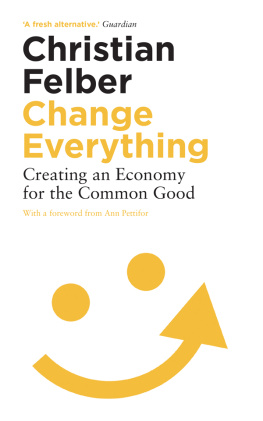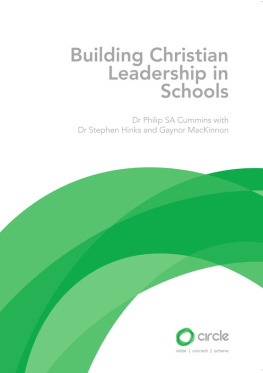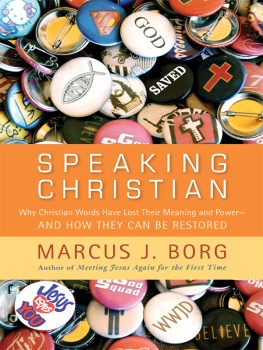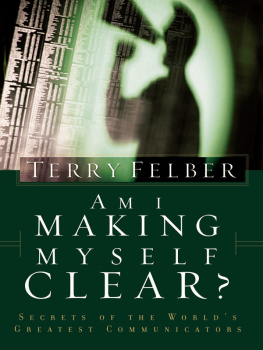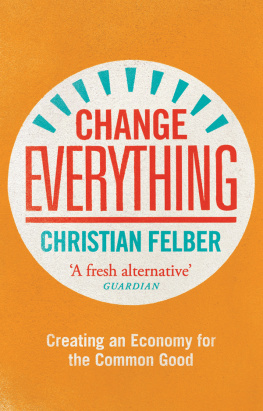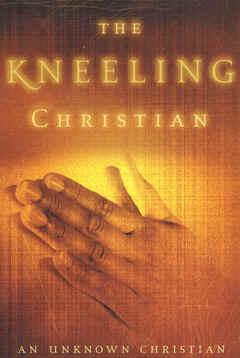Christian Felber - Change Everything
Here you can read online Christian Felber - Change Everything full text of the book (entire story) in english for free. Download pdf and epub, get meaning, cover and reviews about this ebook. year: 2019, publisher: Book Network Intl Limited trading as NBN International (NBNi), genre: Politics. Description of the work, (preface) as well as reviews are available. Best literature library LitArk.com created for fans of good reading and offers a wide selection of genres:
Romance novel
Science fiction
Adventure
Detective
Science
History
Home and family
Prose
Art
Politics
Computer
Non-fiction
Religion
Business
Children
Humor
Choose a favorite category and find really read worthwhile books. Enjoy immersion in the world of imagination, feel the emotions of the characters or learn something new for yourself, make an fascinating discovery.
- Book:Change Everything
- Author:
- Publisher:Book Network Intl Limited trading as NBN International (NBNi)
- Genre:
- Year:2019
- Rating:4 / 5
- Favourites:Add to favourites
- Your mark:
- 80
- 1
- 2
- 3
- 4
- 5
Change Everything: summary, description and annotation
We offer to read an annotation, description, summary or preface (depends on what the author of the book "Change Everything" wrote himself). If you haven't found the necessary information about the book — write in the comments, we will try to find it.
Change Everything — read online for free the complete book (whole text) full work
Below is the text of the book, divided by pages. System saving the place of the last page read, allows you to conveniently read the book "Change Everything" online for free, without having to search again every time where you left off. Put a bookmark, and you can go to the page where you finished reading at any time.
Font size:
Interval:
Bookmark:

More Praise for Christian Felber
A timely and important new vision for the purpose of economic activity, moving away from the private accumulation of wealth and towards the common good. A must read for business leaders, economists, activists, civil servants and politicians Duncan McCann, New Economics Foundation
This is a joyful book of hope and possibility. Everything can be changed, including the depressive mindset that there are no alternatives. Ed Mayo, Co-operatives UK
Economy for the Common Good has demonstrated an ability to draw together a partnership of companies, consumers and communities by offering a fresh alternative. Bruce Watson, Guardian
Offers a clear analysis that combines pragmatic designs for some of the potential institutions of the next system with a strategy for building a movement that can bring these institutions into being. His accessible articulation of a genuine alternative is an important contribution to an essential global conversation. Gar Alperovitz, author, historian, political economist
Through the example of a large number of pioneer companies of the Economy for the Common Good, everyone can see that doing business on the basis of a transparent, holistic, value and stakeholder oriented approach is possible. Lisa Muhr, Goddess of Fortune fashion label entrepreneur
Get involved for concrete alternatives! Get involved in the Economy for the Common Good! Stphane Hessel, former diplomat, essayist and political activist
Christian Felber is an Austrian alternative economist, university lecturer, and associate scholar of the IASS in Berlin-Potsdam. He is an internationally renowned speaker, author of several award-winning bestsellers and a regular commentator on ethics, business and economics. He initiated the Economy for the Common Good movment as well as the project Bank for the Common Good, which ist a cooperative with more than 5000 owners today and offers the first common good account since 2019. Besides, he is a contemporary dancer and performer.
CHANGE
EVERYTHING
Creating an Economy for the Common Good
CHRISTIAN FELBER
Translated by Susan Nurmi
With Forewords by Ann Pettifor and Eric Maskin

Change Everything: Creating an Economy for the Common Good was first published in English in 2015 by Zed Books Ltd, The Foundry, 17 Oval Way, London SE11 5RR, UK
This ebook edition was first published in 2019
Originally published in German in 2012 under the title Die Gemeinwohl-konomie. Aktualisierte und erweiterte Neuausgabe by Paul Zsolnay Verlag, Wien, Austria
www.zedbooks.co.uk
Copyright Deuticke im Paul Zsolnay Verlag, Wien 2012, 2019
The right of Christian Felber to be identified as the author of this work have been asserted by him in accordance with the Copyright, Designs and Patents Act, 1988
Typeset in Adobe Garamond Pro by seagulls.net
Index: John Barker
Cover design: Steve Leard
Printed and bound by CPI Group (UK) Ltd, Croydon, CR0 4YY
All rights reserved. No part of this publication may be reproduced, stored in a retrieval system or transmitted in any form or by any means, electronic, mechanical, photocopying or otherwise, without the prior permission of Zed Books Ltd.
A catalogue record for this book is available from the British Library
ISBN 978-1-78699-746-3 pb
ISBN 978-1-78699-748-7 pdf
ISBN 978-1-78699-747-0 epub
ISBN 978-1-78699-749-4 mobi
New toast:
For the Common Good!
CONTENTS
I wish to express my thanks to the countless individuals who have committed themselves to the further development, dissemination and implementation of the model for an Economy for the Common Good and created a global energy field which is continuously gaining in momentum. These are private persons, entrepreneurs, organizers of events, academics, journalists, public speakers and supporters of various kinds. I specifically wish to thank:
Joachim Sikora, who coined the German term for Economy for the Common Good, Gemeinwohl-konomie , years ago, using it in reference to a reform-oriented economic model (www.joachimsikora.de); Stefano Zamagni and Luigino Bruni, the Italian authors of LEconomia del bene comune , and Herman Daly and John B. Cobb Jr., the American authors of For the Common Good . This convergence of similar approaches and concepts shows that the time is more than ripe for an Economy for the Common Good!
the numerous people who read the manuscript and contributed their ideas, among them Christian Apl, Jean-Philippe Baum, Harro Colshorn, Christian Fischer, Andreas Giselbrecht, Ludmilla Gro, Gnter Grzega, Sophie Gudenus, Astrid Hafner, Gus Hagelberg, Gisela Heindl, Christian Hi, Lutz Knakrgge, Jrg Knall, Franziska Kohler, Katharina Kronsteiner, Erwin Leitner, Christian Loy, Marita Matschke, Lisa Muhr, Sonia Ninik, Isabell Popescu, Alfred Racek, Emanuel Raviola, Andrea Reitinger, Christian Rther, Barbara Stefan, Eva Stilz, Subhash, Rahel Sophia S, Rita Trattnig, Jrg-Arolf Wittig, Wilhelm Zwirner
the very fine and professional team at Deuticke-Verlag which worked together with Bettina Wrgtter, Susanne Rssler, Annette Lechner, Brigitte Kaserer, Peter Guttmann and Martina Schmidt. And in the same way Ken Barlow, his successor Kim Walker, and the whole team at Zed Books who as a workers collective already live many of the values proposed in this book.
the translator Susan Nurmi, who has done an excellent job and conveyed the meaning of every single word.
Gus Hagelberg, who is coordinating the dissemination of the Economy for the Common Good in the Anglo-Saxon world and has contributed decisively to the success of this book.
the ECG UK team around Bridget Knapper, Andy Chapman, Matt Mayer, and colleagues who establish the movement in the United Kingdom and help the global plant growing.
Diego Isabel La Moneda from the Spanish movement who introduced the ECG in Buckingham Palace to representatives from 41 British associations.
Eric Maskin and Ann Pettifor for their humane and engaged Forewords.
Cornelius Pietzner, who is helping me as a personal coach and also with funding of the translation costs.
all those people who have reflected on solidarity-oriented, democratic and sustainable ways of doing business, contributed to the discussion concerning them and/or practise them in their daily lives.
Gaia and Pachamama, custodians of the Common Good.
The common good is widely understood as that which is shared and beneficial for the general welfare of a human community. Christian Felbers Change Everything: Creating an Economy for the Common Good argues persuasively that we must move to a state Aristotle defined as the healthy oikonomia, in which money serves as a means for the good life, from the unnatural chrematistike , in which multiplication of money becomes not just an end in itself, but also the means for exercising dominium over the 99 percent.
Under the capitalist system of chrematistike , credit is the main driver of economic expansion (defined by economists as growth) and consumption. The establishment, over time of a system of credit creation was a civilizational advance, and is a great public good, because, as Keynes argued, it enables us to do what we can do. However, like the magic in Goethes Sorcerers Apprentice it must be managed and regulated. In the hands of financial apprentices it can do great harm. The reckless and deregulated proliferation of easy, but costly money, represents a great danger to the common good. Speculators in globalized capital markets, detached from democratic regulation and oversight, have opened the spigot of the magic that is easy credit and used it to fuel global economic expansion and the constant impetus to capital accumulation by the already-rich. Consumption, in turn, gorges on fossil fuel extraction, accelerating the growth of greenhouse gas emissions.
Next pageFont size:
Interval:
Bookmark:
Similar books «Change Everything»
Look at similar books to Change Everything. We have selected literature similar in name and meaning in the hope of providing readers with more options to find new, interesting, not yet read works.
Discussion, reviews of the book Change Everything and just readers' own opinions. Leave your comments, write what you think about the work, its meaning or the main characters. Specify what exactly you liked and what you didn't like, and why you think so.

